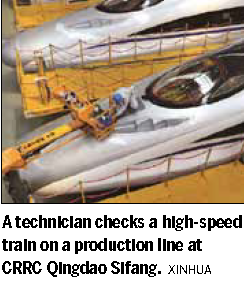Rail sector to become industrial name card

Traditionally known as a national base for the shipbuilding industry, the coastal city of Qingdao in East China's Shandong province is now enjoying robust growth in the high-speed trains manufacturing sector.
Located in the north of Qingdao's Chengyang district, the town of Jihongtan occupies a total area of about 20,500 acres and is regarded as the home of electric multiple unit trains in China.
Around 65 percent of China's EMU trains set off on their first trip from Jihongtan and 25 percent of the subway trains running across China have been produced there.
The area has gathered more than 120 leading companies in the industry, including CRRC Qingdao Sifang and Bombardier. Their products include high-speed EMU trains, intercity express trains, subway trains, suspension trains and low-floor tramcars, as well as control, traction, braking and suspension systems.
The central government recently appointed Qingdao to build China's first national technological innovation centre, providing a further opportunity to upgrade the EMU trains industry in the city.
In recent years, Jihongtan has built itself into a global EMU trains town, which local officials partially attribute to Qingdao's strong industrial foundation and powerful innovation capability in the field of rail transportation.
The national high-speed train technology innovation centre was also launched in Chengyang district, endowing Qingdao with the advantage to perform as a major innovation platform. Local officials said the centre will help to attract more innovative forces and restructure the local economy.
"Focusing on rail transportation equipment, the town will recruit global high-level professionals, optimise the technological innovation system and extend the region's industrial chain," said Liu Yuanchi, head of the department of planning at the Qingdao development and reform commission.
By 2021, the output value of the area's rail transportation industry chain is forecast to exceed 100 billion yuan (£11.6 billion), becoming a "new name card" in Chinese high-end equipment manufacturing in the rail transportation industry, Mr. Liu said.
The top 10 projects attracted to the area are worth 300 billion yuan in total, with specialisms ranging from high-speed wheel tracks and high-speed maglev demonstration testing lines, to infrastructure and public services.
Eighteen projects are currently under construction, with a combined investment of 4 billion yuan, which are expected to generate 12 billion yuan in annual output value when completed. Thirteen of them are related to rail transportation. Another 17 industrial projects and eight projects related to research institutions are under negotiation.

MOST POPULAR
- 1 China to give visa-free treatment to another 9 countries
- 2 China fully opens manufacturing sector to foreign investors in landmark opening up move
- 3 China's import expo attracts record-breaking participating countries, exhibitors
- 4 China's door opening even wider to foreign visitors, businesses
- 5 China revises rules to ease foreign strategic investment in listed firms
Editors' Picks
 Video:
Peru sees new port open
Video:
Peru sees new port open
 Infographic:
China's public holidays for 2025
Infographic:
China's public holidays for 2025
 Infographic:
Basic facts of APEC
Infographic:
Basic facts of APEC
 Infographic:
Wrapping up the 7th CIIE: Data recap
Infographic:
Wrapping up the 7th CIIE: Data recap



